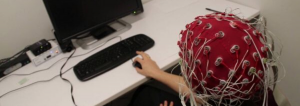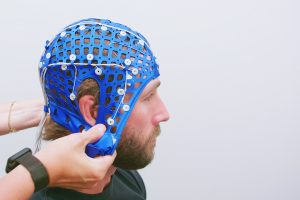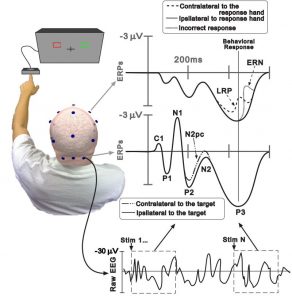A “breakthrough” technology to help measure and evaluate the health of our brain has been developed in Hamilton, proven in Canada and it’s now ready to enter the U.S. market.

VoxNeuro’s “CHAMP” technology is part of the toolkit used by assessment clinicians and health care providers to track brain health in short- and long-term contexts. VoxNeuro image.
VoxNeuro intends to change the way brain health is managed and treated, using its new “software as a medical device” called the Cognitive Health Assessment Management Platform, or CHAMP.
The tech solution is part of the toolkit used by assessment clinicians and health care providers to track brain health in short- and long-term contexts.
There are many factors that can affect or cause brain disorders and negatively impact cognitive function. Aging is one, of course, but so too concussion, traumatic brain injury, dementia or, now, sadly, the neurological impacts of COVID-19 and its effects on so-called “long-haulers”.
Some of the most common symptoms tied to cognitive dysfunction include fatigue, memory loss or brain fog. Yikes! Sounds all too familiar!

MMA athlete and coach Cody Kent is being prepared for a VoxNeuro Cognitive Health Assessment at a Back in Action Health Clinic. Photo: Andrew Price Images.
And the wearable part of the CHAMP system seems familiar, too: it’s like a swimming cap (but covered with lots of small sensors, connected by wire to nearby computers).
VoxNeuro’s technology measures the tiny bursts of electrical activity in the brain; much like a cardiogram uses heart rate data to deliver insights that can be used to predict and prevent heart disease, these little brain biomarkers have similar diagnostic and treatment potential.
Those biomarkers are known collectively as electroencephalographic event-related potential data (ERP). By analyzing the ERP gathered during a quick 15-minute assessment, CHAMP provides a score, if you will, made up of objective and actionable data profiles from four key cognitive functions: memory, information processing, attention and concentration.
The data is used by clinicians in the diagnostic process, then to track how well treatments are working over time, and to determine if special customized treatments are needed in order to reach the best possible outcomes for patients.
Based on some 30 years of peer-reviewed scientific research, the event-related potential technique quickly became a primary tool for cognitive neuroscientists, once broadly accessible, and particularly valuable for testing theories of perception and attention. Researchers may discuss the large number of EEG sensor electrodes typically used, and how to determine an individual optimal sensor selection, but the technique and its value are well-established.

VoxNeuro plans the distribution of its technology across North America. VoxNeuro image.
Now the VoxNeuro has successfully obtained registration with the U.S. Food and Drug Administration for the distribution of the CHAMP software, as a Class II Exempt Medical Device, the potential patient pool has expanded enormously.
“This is a great day for people suffering from neurological disorders and the dedicated clinicians who are always searching for better ways to evaluate them,” said Dr. John F. Connolly, Chief Science Officer and Co-Founder of VoxNeuro, when the FDA approval was announced. “Clinicians will have more certainty, with more objective information about how a patient’s brain is functioning. That certainty will help facilitate faster and better diagnoses and more effective treatments for patients.”
The FDA registration enables VoxNeuro to expand the distribution of its technology from where it was developed, research-intensive McMaster University in Hamilton, Ontario, across North America.
Ty Shattuck is Chief Executive Officer at the McMaster Innovation Park (MIP) where VoxNeuro is headquartered, and where support, space and other resources are available to entrepreneurs, start-ups, and researchers to help bridge gaps between pure research and market success.
“Our goal is to drive new collaborations and we rely on the expertise of our advisors and investors who are pivotal in the continued success of MIP’s thriving ecosystem,” Shattuck said of the VoxNeuro news. “The team at VoxNeuro is exceptional to work with. They are focused on their mission and receptive to the recommendations we provide. All of MIP is celebrating with them on reaching such an exciting milestone.”
The company has benefitted from other support, as well.
In 2020, another Hamilton-based company that supports businesses in the life sciences and new technologies in the health and life science fields, Bay Area Health Trust, made an investment in VoxNeuro designed to extend its reach well beyond the region, benefitting health care systems across Canada.
Then, last September, VoxNeuro was selected by a panel of venture capitalists and leaders in the digital health ecosystem to participate in the Canadian Technology Accelerators (CTA) Digital Health program. The program helped connect VoxNeuro with key players and resources needed for the expansion to the U.S.
“VoxNeuro was selected as one of Canada’s most promising early-stage digital health start-ups based on their potential for growth and market impact. It has been a pleasure to witness VoxNeuro’s trajectory and see the impact of the expertise offered by the Canadian Technology Accelerator program in action. The program supported VoxNeuro’s introduction to key experts that assisted with their US go-to-market and billing strategy and opened the door to large prospective strategic partners” said Molly Rafelson, Trade Commissioner, Canadian Technology Accelerator. “We look forward to watching VoxNeuro continue to scale into new markets on their journey to improving healthcare globally.”
# # #

A researcher’s graphic shows idealized event-related potential (ERP) waveforms elicited during a visual search task, from A Brief Introduction to the Use of Event-Related Potentials (ERPs) in Studies of Perception and Attention by Geoffrey F. Woodman. Atten Percept Psychophys. 2010 Nov; 72(8): 10.3758/APP.72.8.2031.
-30-



